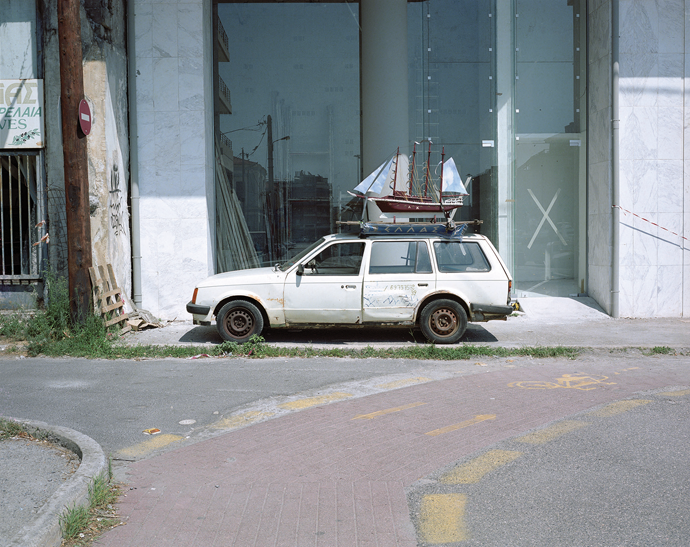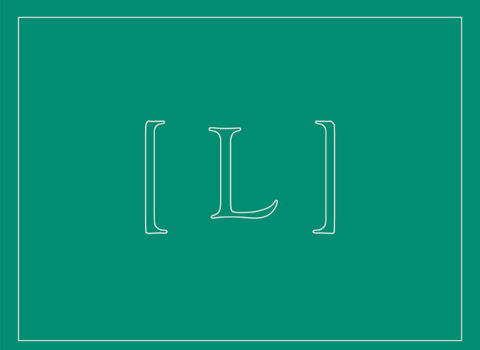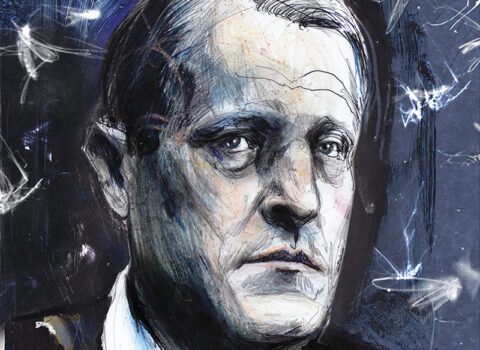Discussed in this essay:
Good Will Come from the Sea, by Christos Ikonomou. Translated from the Greek by Karen Emmerich. Archipelago. 252 pages. $18.
Something Will Happen, You’ll See, by Christos Ikonomou. Translated from the Greek by Karen Emmerich. Archipelago. 276 pages. $18.
Christos Ikonomou’s powerful short stories chronicle the lives—and inner lives—of struggling, working-class Greeks: unemployed, desperately poor, men and women, young and old, the victims of Greece’s decadelong economic crisis and of failed austerity measures, the consequences of massive government debt and a long, catastrophic recession. The two collections—Something Will Happen, You’ll See and Good Will Come from the Sea—which have been published here in superb translations by Karen Emmerich, have, as their titles, predictions and promises that don’t come true—certainly not in the hopeful ways they might seem to suggest.

“Ship,” by Georges Salameh. Courtesy the artist
Set in the port city of Piraeus, not far from Athens, many of the stories in Something Will Happen were written before the crisis of 2008. But life in Ikonomou’s Piraeus is already grim enough. A couple breaks up over the contents of a piggy bank. A father who lost his job when the local factory shut down scrambles for the money to feed his son and buy him a chocolate Easter egg—a quest that ends in a painful encounter with Jesus’ crown of thorns.
In “The Things They Carried,” five men warm themselves around a fire outside the social security office on a bitterly cold January night so they can be the first on line to consult the doctors in the morning. The litany of what they bring with them echoes Tim O’Brien’s story about soldiers in Vietnam, though what these beleaguered Greeks carry has more to do with poverty, memory, and loss than with the revelatory contents of an American soldier’s pack. “Deep inside,” Ikonomou writes, “each carried fear and stress and worry about illness and time, which came each day like a conscientious gardener to trim off a bit of their lives.”
The stories in Good Will Come from the Sea take place on an unnamed island to which a group of mainland Greeks have migrated, drawn by the promise of a fresh start and a marginally better life. Instead they find a society that has sunk lower than the one they left behind. In Athens, a character tells us, it’s easier—there are more people, you can do what you want. But everyone on the island knows everyone and hears everything, and criminals are in charge. Thugs, thieves, and killers have moved into the vacuum left by the lack of a functioning government.
The newcomers are hated by the locals, who call them “foreigners” and “Athenians,” regardless of whether they come from Athens. In turn, the recent arrivals refer to the locals as “rats.” Hardly noticed by tourists struggling with restaurant menus, the two groups are locked in combat. When a baptismal font disappears from a church, the “rats” accuse the “Athenians” of stealing it:
The hell we did, we said. What the fuck would we do with a font? Use it as a kiddie pool or something? No, they said, you sold it for copper. Ten euros per kilo, a hundred-kilo font, that’s a clean thousand in your pockets. Well, we said, if we’re counting to a thousand, your wives and daughters have probably sucked a thousand dicks this year, you can start there.
Idealists don’t fare well in this world. In the opening story, “I’ll Swallow Your Dreams,” an optimist named Tasos believes it might be possible to improve life on the island:
Good will come from the sea, he said. I don’t know why that had stuck in his head, but he said it all the time. And always in the same way, kind of singing, and if you asked, he’d tell you it was a line from a song.
Everyone knows better than to complain about the homegrown mafiosi who ship the island’s agricultural produce to Athens and sell the islanders (at a huge markup) Dutch tomatoes, Egyptian potatoes, grouper from Senegal, and “navel oranges, origin South Africa, warning, rind unsuitable for human consumption, preserved with imazalil and thiabendazole . . . drenched in insecticides.” The price of protest is too high. “Who in their right mind would speak up? . . . Henchmen, guys packing heat, a whole parade of Corleones. You talk, you’re done. You raise your head, they blow it off.”
Only Tasos keeps talking, until his protests anger Xellinakis, the mobster who controls the import business, and whose thugs find creative ways to silence Tasos: “They tied him to the hood of his truck and ran him through the car wash. Soap, brushes, industrial dryers, the whole works. He was in the hospital for a week, broken teeth, his body flayed by the brushes and chemicals.”
Tasos refuses to back down, urges his neighbors to organize and threatens to make the criminals repay what they’ve stolen:
From now on you’ll put ten percent of your profits every year toward building roads, sidewalks, nursery schools. . . . It’s time for you to do something for the island. And since you won’t do it on your own, we’ll have to force you. . . .
That’s the sort of stuff he said, the same bullshit you read online by the average blogger in need of a good lay.
Tensions escalate until a confrontation occurs outside a cave, known as the Refuge, where Tasos and his community are celebrating Easter. The choice of the cave—as a party space and killing ground—can’t be accidental. The author, his characters, and presumably his readers are aware of the role that caves served as portals to the underworld in Greek mythology and literature. And that’s how the Refuge functions for poor Tasos:
He stood there at the mouth of the cave—a little drop of a man before all that black. He stood and looked at us, his eyes as red as can be, and his face red too, his scars seemed to have swollen and his whole face looked like a mask that someone held up to the fire until it slowly started to melt. He pulled the gun from his pocket and said something that none of us heard, then disappeared into the cave at a run.
Tasos’s wife and friends sit outside around a campfire, waiting for him to reappear, knowing he won’t. They are frightened, first of
things coming alive in the dark. . . . And then another fear grips you, a bigger one, because you realize how terrifying it is, how terrifying that you’ve begun to react not like a person but like something else. . . . And what scares you most of all is that you don’t know what that other thing is that you’ve started to become—what will come next, what does a person become when he stops being a person, what is there on the other side of human?
Then you think how, in the end, this is what that poor bastard Tasos was trying to do. He may not have known it, but he was struggling to stay human, to keep on being a person. Not a good person, or a proper person, or a better person, just a person—a person, plain and simple.
This question—how does one maintain one’s humanity in a destroyed country?—is at the heart of many of these stories. It runs beneath the descriptions of poverty, unemployment, of taking or not taking political action, of dreams nurtured or shattered. In an interview in The Nassau Literary Review in 2015, Ikonomou spoke of his work as both documenting and transcending the hardships of life in modern Greece to get at something universal, to get under the skin of his characters and reveal what they share with people everywhere:
Literature is not some kind of political manifestation. Yes, of course as a writer you may have whatever ideology or political principles, or you may be left, right, or whatever, but here these people have their own personalities. . . . They are saying and they are doing a lot of things that I would not say or do myself, but that’s . . . why I am writing literature. I’m trying to be someone else.
Many of his characters have a very clear, tough-minded sense of what has gone wrong with their country, but because these characters are so well drawn and fully realized, their political analysis feels uniquely theirs, not that of the author speaking through them. In “Kites in July,” a young man, Stavros, disagrees about recent history with his girlfriend’s rich Greek-German (“more German than German”) uncle. According to Uncle Raphael:
Over the past few years, Greece had committed the perfect crime. Actual perpetrators: politicians. Moral perpetrators: voters. Motive: to buy people’s conscience. Weapon: money—foreign money, black market money, easy money. Victim: the nation.
That was his theory in a nutshell. And as much as Stavros felt like giving him a piece of his mind in return, he always held his tongue.
Do us a favor and go fuck yourself, Uncle Raphael, he wanted to say. Everyone’s always pointing fingers at this crime or that, but the Germans sure are ones to speak. And drop that line about Europe already. What Europe? Europe only existed on maps and in books. . . . What do I have to do with a Dane, a Swede, a Czech? And what exactly was our crime? The fact that we wanted a shingle or two over our heads, wanted to buy a car?
Ikonomou gives great dignity and intelligence to his characters, who are capable of quick humor, of complex philosophical inquiry, moral speculation, and metaphysical rumination. They want myths, and like us they want to be told stories. The father searching for his lost son in “Good Will Come from the Sea”—the son he urged to go work for a sociopathic shipowner—passes landmarks with fairy-tale names (Dragon Cave, Beast’s Hole, Mute’s Spring, Seven Threshing Floors, Murderer’s Gorge, the Church of the Butchered Virgin) and longs for the resolution that ends even the most frightening fairy tales.
“Fairy tales always end well,” he thinks aloud to himself. “Right? Right. They lived well and we live even better. Of course. That’s how the story goes.”
Ikonomou’s heroes are often reduced to silence; they can’t say what needs to be said. In “Placard and Broomstick,” a man attempting to make a sign protesting the workplace death of his friend winds up appearing at the site with a blank placard, because what he wants to say is too monumental and bewildering to fit onto a piece of cardboard:
He wanted to write something that would express unspeakable rage and hatred and love and despair all at once. Or maybe it should be some plain, dry slogan, the kind of thing a political party might say about workplace fatalities, about people who die on the job. Or maybe something like the things they write on the gravestones of people who die in vain, or too young. Something about god and the soul and angels and the afterlife.
Stavros and Artemis, the lovers in “Kites in July,” have a vision not unlike Tasos’s: they plan to build an eco-friendly hotel and use the profits to help the island.
The couple borrows money from Artemis’s Uncle Raphael and renovates a shack they plan to open as a waterfront ouzerie called Good Will Come from the Sea. Their friends warn them that it’s madness to undercut what the gangsters are charging in their cafés. (“It’s like me renting a double room for twenty euros a night when everyone else in my category charges a hundred. That’s not how things work. There’s a system. There are cartels.”) But the couple clings to their dream.
By now the reader already knows that the couple’s little world has ended before it began. The ouzerie has been torched by the same gangsters who drove Tasos into the cave at the collection’s start. “Those rats had done a fine job. Real professionals. It was all ash now, nothing was left standing.”
Throughout, Ikonomou’s style veers between flights of incantatory lyricism and volleys of funny lines and tough street talk. Again one wants to praise Karen Emmerich’s translation: How does one recognize and render the Greek words for “scratch-offs and quick picks”? Sentences go on for pages as characters mourn lost loves and debate the virtues of selflessness and the existence of evil.
In “Something Will Happen, You’ll See,” a woman whose home is about to be seized by the bank watches TV and thinks about her life in a passage that precisely renders the types of thought processes that make Ikonomou’s work—despite the sad stories it tells—so energizing and moving:
There was a documentary on about American Indians but Niki just stared out the balcony door at the glow from the floodlights over at the electric plant. That afternoon a bunch of workers had climbed up on the chimney and hung a banner and shouted slogans. She watched the beams from the floodlights slicing the darkness like enormous swords and wondered how an artist would paint this scene—if there were still artists left in the world who painted scenes like that: a woman sitting in the dark with a cup of coffee and a cigarette, her face lit by the dim blue light of the television. Wouldn’t be much of a painting. Maybe if she had a gun in her hand, or a vibrator. Coffee and cigarettes wouldn’t cut it. People don’t get excited any more about old-fashioned things. Who cares about the finances and family problems of the petit bourgeoisie? Très banal.
The rhapsodic lyricism and dry gallows humor, the speed and nimbleness of the tonal shifts, drew me in to these books. The sympathy of Ikonomou’s characterization—the humanity he captures on the page—made me keep reading. These stories show the challenges of ordinary life—falling in love, working or not working, living in families, dying—in a destroyed economy. It’s one thing to read a newspaper item about how the Greek austerity measures cut back basic services, but it’s a different thing entirely to find ourselves, thanks to Ikonomou, in a scruffy neighborhood, where the streetlights have gone out and a scrawny young guy named Mao, whose sister has been gang-raped, sits outside in the pitch dark, accompanied only by his cat, keeping watch over his blacked-out streets.

















































































































